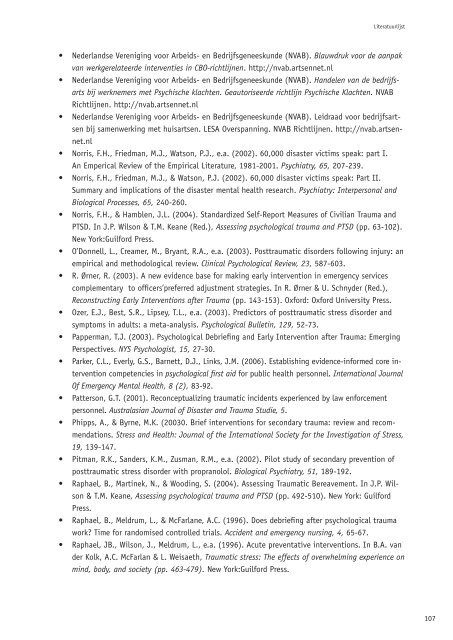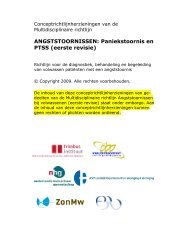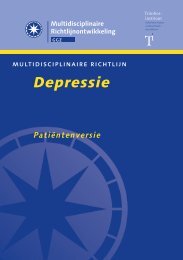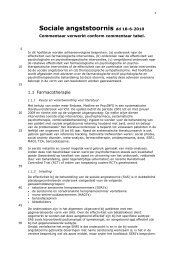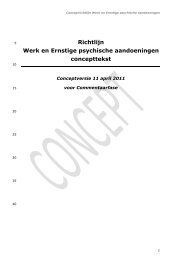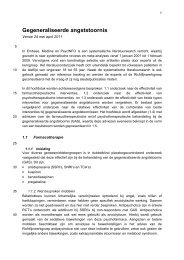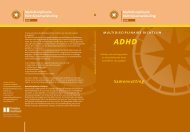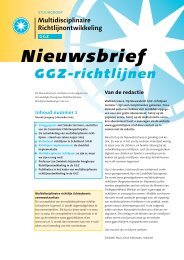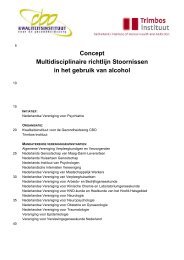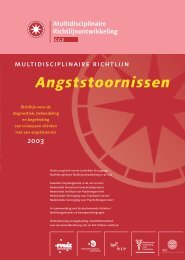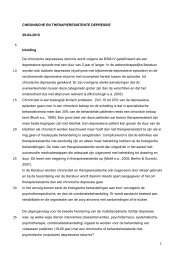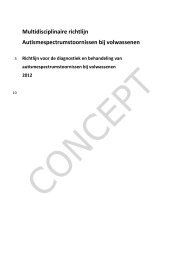Literatuurlijst• Mayou, R.A., Ehlers, A., & Bryant, B. (2002). Posttraumatic stress disorder after motor vehicleaccidents: 3-year follow-up of a prospective longitudi<strong>na</strong>l study. Behaviour Research and Therapy,40, 665-675.• Mayou, R.A., Ehlers, A., & Hobbs, M. (2000). Psychological debriefing for road traffic accidentvictims: Three-year follow-up of a randomised controlled trial. British Jour<strong>na</strong>l of Psychiatry, 176,589-593.• Mellman, T.A., Bustamante, V., David, D., e.a. (2002). Hypnotic medication in the aftermath oftrauma. Jour<strong>na</strong>l of Clinical Psychiatry, 63, 1183-1184.• Milgram, N. (2004). Mass Trauma Intervention Goes to School. Anonymous. Anonymous. US:American Psychological Association. 49, 2004.• Miller, J. (2003). Critical incident debriefing and social work: Expanding the frame. Jour<strong>na</strong>l ofSocial Service Research 30:7-25, 2003.• Miller, L. (1999). Critical Incident Stress Debriefing: Clinical applications and new directions.Inter<strong>na</strong>tio<strong>na</strong>l Jour<strong>na</strong>l of Emergency Mental Health, 1, 253-265.• Miller, L. (2002). Psychological interventions for terroristic trauma: Symptoms, syndromes, andtreatment strategies. Psychotherapy: Theory, Research, Practice, Training, 39, 283-296.• Miller, M.E., & Cohen, S. (2001). Psychological interventions and the immune system: a metaa<strong>na</strong>lyticreview and critique. Health psychology: official jour<strong>na</strong>l of the Division of Health Psychology,20, 47-63.• Mitchell, J.T. (2003). Major misconceptions in crisis intervention. Inter<strong>na</strong>tio<strong>na</strong>l jour<strong>na</strong>l of emergencymental health, 5, 185-197.• Mitchell, M. (1999). A current view from the UK on post incident care: ‘Debriefing,’ ‘defusing’ andjust talking about it. Anonymous. Anonymous. Springfield, IL, US: Charles C. Thomas Publisher.• Mitchell, M., Sakraida, T.J., & Kameg, K. (2003). Critical incident stress debriefing: implicationsfor best practice. Disaster ma<strong>na</strong>gement & response: DMR: an officia .publication of the EmergencyNurses Association, 1, 46-51.• Mitchell J.T. & Everly G.S. (1996). Critical Incident Stress Debriefing: An Operations Manual. EllicottCity, MD: Chevron Publishing Corporation• Mitte, K., Steil, R., & Nachtigall, C. (2005). Eine Meta-A<strong>na</strong>lyse unter Einsatz des Random Effects-Modells zur Effektivität kurzfristiger psychologischer Interventionen <strong>na</strong>ch akuter Traumatisierung.Zeitschrift für Klinische Psychologie und Psychotherapie: Forschung und Praxis, 34, 1-9.• Murray, J., Ehlers, A., & Mayou, R.A. (2002). Dissociation and post-traumatic stress disorder: Twoprospective studies of road traffic accident survivors. British Jour<strong>na</strong>l of Psychiatry, 180, 363-368.• Nachtigall, C., Mitte, K., & Steil, R. (2003). Zur Vorbeugung posttraumatischer Symptomatik <strong>na</strong>cheiner Traumatisierung: Eine Meta-A<strong>na</strong>lyse zur Wirksamkeit kurzfristiger Interventionen. Verhaltenstherapie& Psychosoziale Praxis, 35, 273-281.• Natio<strong>na</strong>l Institute for Clinical Excellence (NICE). (2005). Post-traumatic stress disorder (PTSD).Anxiety: Ma<strong>na</strong>gement of post-traumatic stress disorder in adults in primary, secondary and communitycare. London, UK: Natio<strong>na</strong>l Health Service, Natio<strong>na</strong>l Collaborating Centre for Mental Health.www.nice.org.uk• Nederlands Huisartsen Genootschap. (2004). NHG-standaard Angststoornissen M62. Utrecht: NHG.• Nederlands Huisartsen Genootschap. (2003). NHG-standaard Depressie M62. Utrecht: NHG.• Nederlands Huisartsen Genootschap. (2005). NHG-standaard standaard slaapproblemen en slaapmiddelen.Utrecht: NHG.106
Literatuurlijst• Nederlandse Vereniging voor Arbeids- en Bedrijfsgeneeskunde (NVAB). Blauwdruk voor de aanpakvan werkgerelateerde <strong>interventies</strong> in CBO-<strong>richtlijnen</strong>. http://nvab.artsennet.nl• Nederlandse Vereniging voor Arbeids- en Bedrijfsgeneeskunde (NVAB). Handelen van de bedrijfsartsbij werknemers met Psychische klachten. Geautoriseerde richtlijn Psychische Klachten. NVABRichtlijnen. http://nvab.artsennet.nl• Nederlandse Vereniging voor Arbeids- en Bedrijfsgeneeskunde (NVAB). Leidraad voor bedrijfsartsenbij samenwerking met huisartsen. LESA Overspanning. NVAB Richtlijnen. http://nvab.artsennet.nl• Norris, F.H., Friedman, M.J., Watson, P.J., e.a. (2002). 60,000 disaster victims speak: part I.An Emperical Review of the Empirical Literature, 1981-2001. Psychiatry, 65, 207-239.• Norris, F.H., Friedman, M.J., & Watson, P.J. (2002). 60,000 disaster victims speak: Part II.Summary and implications of the disaster mental health research. Psychiatry: Interperso<strong>na</strong>l andBiological Processes, 65, 240-260.• Norris, F.H., & Hamblen, J.L. (2004). Standardized Self-Report Measures of Civilian Trauma andPTSD. In J.P. Wilson & T.M. Keane (Red.), Assessing psychological trauma and PTSD (pp. 63-102).New York:Guilford Press.• O’Donnell, L., Creamer, M., Bryant, R.A., e.a. (2003). Posttraumatic disorders following injury: anempirical and methodological review. Clinical Psychological Review, 23, 587-603.• R. Ørner, R. (2003). A new evidence base for making early intervention in emergency servicescomplementary to officers’preferred adjustment strategies. In R. Ørner & U. Schnyder (Red.),Reconstructing Early Interventions after Trauma (pp. 143-153). Oxford: Oxford University Press.• Ozer, E.J., Best, S.R., Lipsey, T.L., e.a. (2003). Predictors of posttraumatic stress disorder andsymptoms in adults: a meta-a<strong>na</strong>lysis. Psychological Bulletin, 129, 52-73.• Papperman, T.J. (2003). Psychological Debriefing and Early Intervention after Trauma: EmergingPerspectives. NYS Psychologist, 15, 27-30.• Parker, C.L., Everly, G.S., Barnett, D.J., Links, J.M. (2006). Establishing evidence-informed core interventioncompetencies in psychological first aid for public health personnel. Inter<strong>na</strong>tio<strong>na</strong>l Jour<strong>na</strong>lOf Emergency Mental Health, 8 (2), 83-92.• Patterson, G.T. (2001). Reconceptualizing traumatic incidents experienced by law enforcementpersonnel. Australasian Jour<strong>na</strong>l of Disaster and Trauma Studie, 5.• Phipps, A., & Byrne, M.K. (20030. Brief interventions for secondary trauma: review and recommendations.Stress and Health: Jour<strong>na</strong>l of the Inter<strong>na</strong>tio<strong>na</strong>l Society for the Investigation of Stress,19, 139-147.• Pitman, R.K., Sanders, K.M., Zusman, R.M., e.a. (2002). Pilot study of secondary prevention ofposttraumatic stress disorder with propranolol. Biological Psychiatry, 51, 189-192.• Raphael, B., Martinek, N., & Wooding, S. (2004). Assessing Traumatic Bereavement. In J.P. Wilson& T.M. Keane, Assessing psychological trauma and PTSD (pp. 492-510). New York: GuilfordPress.• Raphael, B., Meldrum, L., & McFarlane, A.C. (1996). Does debriefing after psychological traumawork? Time for randomised controlled trials. Accident and emergency nursing, 4, 65-67.• Raphael, JB., Wilson, J., Meldrum, L., e.a. (1996). Acute preventative interventions. In B.A. vander Kolk, A.C. McFarlan & L. Weisaeth, Traumatic stress: The effects of overwhelming experience onmind, body, and society (pp. 463-479). New York:Guilford Press.107
- Page 5 and 6:
OrganisatiestructuurDe multidiscipl
- Page 7 and 8:
Dhr. M.P. Vermeulen - Vereniging vo
- Page 9:
A: Publieksdeel
- Page 12 and 13:
Inleiding publieksdeelhoogwaardige
- Page 14 and 15:
Richtlijntekst publieksdeelSteunend
- Page 16 and 17:
Richtlijntekst publieksdeelCuratiev
- Page 18 and 19:
Overzicht aanbevelingen• Het bied
- Page 20 and 21:
Overzicht aanbevelingen33. De werkg
- Page 23 and 24:
Inleiding1 InleidingIn Nederland wo
- Page 25 and 26:
InleidingPrimair is gezocht naar be
- Page 27:
InleidingNiveau van bewijskracht va
- Page 31 and 32:
Screening3 ScreeningVan screening o
- Page 33 and 34:
ScreeningOverige overwegingenBoveng
- Page 35 and 36:
ScreeningConclusieNiveau 3Er is onv
- Page 37 and 38:
Screeningouders en na 3-13 maanden
- Page 39 and 40:
ScreeningVoor bevolkingsonderzoek n
- Page 41:
Screeningdat er mensen met voorbijg
- Page 44 and 45:
Steunende contextConclusieNiveau 4E
- Page 47 and 48:
Preventieve vroegtijdige psychosoci
- Page 49 and 50:
Preventieve vroegtijdige psychosoci
- Page 51 and 52:
Preventieve vroegtijdige psychosoci
- Page 53 and 54:
Preventieve vroegtijdige psychosoci
- Page 55 and 56: Preventieve vroegtijdige psychosoci
- Page 57 and 58: Curatieve vroegtijdige psychosocial
- Page 59 and 60: Curatieve vroegtijdige psychosocial
- Page 61 and 62: Curatieve vroegtijdige psychosocial
- Page 63 and 64: Curatieve vroegtijdige psychosocial
- Page 65 and 66: Curatieve vroegtijdige psychosocial
- Page 67: Curatieve vroegtijdige psychosocial
- Page 70 and 71: OrganisatieWetenschappelijke onderb
- Page 72 and 73: Organisatie7.3.2 Platform voor getr
- Page 75 and 76: Bijlage 1 NamenBijlage 1 NamenDe we
- Page 77 and 78: Bijlage 1 NamenGedurende de ontwikk
- Page 79 and 80: Bijlage 2 UitgangsvragenBijlage 2 U
- Page 81 and 82: Bijlage 3 Ervaringen van getroffene
- Page 83 and 84: Bijlage 3 Ervaringen van getroffene
- Page 85 and 86: Bijlage 3 Ervaringen van getroffene
- Page 87 and 88: Bijlage 3 Ervaringen van getroffene
- Page 89: Bijlage 3 Ervaringen van getroffene
- Page 92 and 93: Bijlage 4 Lijst met afkortingenWet
- Page 95: Bijlage 5 Overzicht aanbevolen onde
- Page 98 and 99: Literatuurlijst• Bisson, J.I., Mc
- Page 100 and 101: Literatuurlijst• Bryant, R.A. (20
- Page 102 and 103: Literatuurlijst• Echeburua, E., C
- Page 104 and 105: Literatuurlijst• Gray, M.J., Litz
- Page 108 and 109: Literatuurlijst• Raphael, B., & W
- Page 110: Literatuurlijst• Townsend, C.J.,


